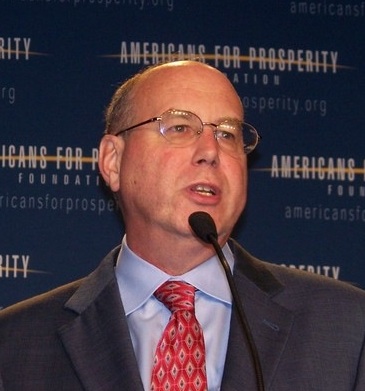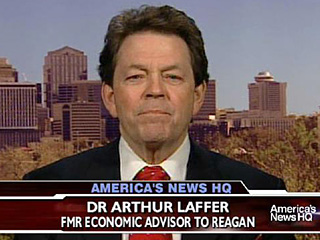Submitted by Nick Surgey on
An array of right-wing organizations in North Carolina are arguing loudly for Governor Pat McCrory to radically alter how corporations and people pay taxes in the state -- and the not-so-hidden hand behind the effort is North Carolina millionaire Art Pope, a close ally of the Koch brothers, who funds the groups and has been appointed as North Carolina's Budget Director.
 The John William Pope Civitas Institute, the John Locke Foundation, and the North Carolina chapter of Americans for Prosperity (AFP), have been loudly calling for cuts to shift the tax burden away from rich folks like Pope and onto the backs of the working poor and middle class. Pope created and almost entirely funds Civitas, was the founding chairman of the John Locke Foundation (providing 80 percent of its funding in 2011), and until recently was on the national board of AFP, only stepping down from all three organizations after his appointment as budget director.
The John William Pope Civitas Institute, the John Locke Foundation, and the North Carolina chapter of Americans for Prosperity (AFP), have been loudly calling for cuts to shift the tax burden away from rich folks like Pope and onto the backs of the working poor and middle class. Pope created and almost entirely funds Civitas, was the founding chairman of the John Locke Foundation (providing 80 percent of its funding in 2011), and until recently was on the national board of AFP, only stepping down from all three organizations after his appointment as budget director.
Recently Pope criticized elements of the Civitas plan, but his attempt to distance himself from organizations he has founded, funded, and helped run are a little too politically convenient for many.
Progressive advocates say Pope is playing a shrewd political game, utilizing his numerous proxies to voice extreme ideas that will provide political cover for the governor to gradually push major tax changes between now and his reelection in 2016. If McCrory's future tax plans contain major giveaways to corporations and the rich -- which many expect is likely -- those giveaways could appear moderate and reasonable in comparison with the plans advanced by Civitas, AFP, and the John Locke Foundation.
Extreme Proposals Prepare the Ground for Major Changes
Pope, a former North Carolina state legislator who inherited the Variety Wholesalers business from his father, has invested tens of millions building a formidable political infrastructure in North Carolina and taking advantage of the U.S. Supreme Court's Citizens United decision to bankroll North Carolina candidates.
Marc Farinella, an adviser to former Governor Bev Perdue, told the New Yorker's Jane Mayer in 2011, "The Republican agenda in North Carolina is really Art Pope's agenda. He sets it, he funds it, and he directs the efforts to achieve it. The candidates are just fronting for him. There are so many people in North Carolina beholden to Art Pope -- it undermines the democratic process."
When McCrory appointed Pope as his budget director in 2012, many progressives in the state feared sweeping tax cuts were on the way. The governor has been mostly silent, so far, but the three Pope-tied groups have each released their own highly regressive tax plans.
 The Civitas tax plan was written by Arthur Laffer, the author of the annual American Legislative Exchange Council (ALEC) tax publication "Rich States, Poor States." The two plans are like peas in a pod. Like the ALEC publication, the Civitas plan proposes austerity coupled with abolishing individual and corporate income taxes and replacing them with an increased state sales tax. A sales tax is regressive, since the less a person earns, the greater proportion of their income is eaten up by the tax. According to the North Carolina Justice Center, such a shift would mean a tax cut for the wealthiest 20 percent, while placing a greater financial burden on the bottom 60 percent. This would translate into a $500 tax increase for somebody earning $24,000, but a $41,000 decrease for a $1 million earner.
The Civitas tax plan was written by Arthur Laffer, the author of the annual American Legislative Exchange Council (ALEC) tax publication "Rich States, Poor States." The two plans are like peas in a pod. Like the ALEC publication, the Civitas plan proposes austerity coupled with abolishing individual and corporate income taxes and replacing them with an increased state sales tax. A sales tax is regressive, since the less a person earns, the greater proportion of their income is eaten up by the tax. According to the North Carolina Justice Center, such a shift would mean a tax cut for the wealthiest 20 percent, while placing a greater financial burden on the bottom 60 percent. This would translate into a $500 tax increase for somebody earning $24,000, but a $41,000 decrease for a $1 million earner.
In January 2013, Civitas invited Laffer to provide a day-long "briefing" to newly elected legislators. ALEC legislators from outside North Carolina also presented at the event. "Go to the goal line," Laffer told the North Carolina legislators, urging a tax code overhaul. "I can't tell you how proud I am of you."
Pope was an ALEC member when he was a state legislator in the early 1990s, named by them in a 1990 ALEC bulletin for promoting the organization's tax and fiscal policy legislation. The Pope foundation provided ALEC with a grant in 1998, for a publication that argued against the minimum wage and in favor of anti-union "right to work" laws.
"The Civitas/Laffer plan will not pass this year, but it will be introduced and there will be a debate," Chris Fitzsimon, Director of NC Policy Watch, told the Center for Media and Democracy (CMD). "When McCrory does come out and present his own plan, which will be slightly less right-wing than the Civitas/Laffer plan, people might think, 'well, it could have been worse.' But McCrory has more budgets to present before he has to run for reelection, more opportunities to put forward this plan piece by piece."
Shifting the Tax Burden From the Rich to the Middle Class
This year marks the first time since 1870 that the GOP has had trifecta control over North Carolina, holding both the House and Senate as well as the governor's mansion. Numerous tax bills have already been introduced in the House and the Senate, including legislation that would cut corporate and personal income taxes, slash the corporate franchise tax, and eliminate the estate tax. Further tax bills will likely be proposed before the session ends in June.
The proposals reflect elements of the plans from Civitas, AFP, and the John Locke Foundation. Slashing the Earned Income Tax Credit means higher taxes for the poor and middle classes, while eliminating the estate tax means the wealthiest 0.2 percent of the population will see major tax benefits. According to the Associated Press, just eliminating the estate tax would result in an estimated loss of $52 million in state revenue for the next fiscal year.
"The average taxpayer in North Carolina probably expected a tax cut from McCrory and the Republicans in the legislature," Justin Guillory from Progress North Carolina told CMD. "If you are rich, you'll definitely get one. But it's unclear that average folks will see any benefits at all. If sales taxes go up to make up for income tax cuts, it's likely that some North Carolinians will actually see their overall taxes go up."
Brendan Fischer contributed to this article.
| Attachment | Size |
|---|---|
| 49.74 KB |

Comments
Anonymous replied on Permalink
Republicans in North Carolina